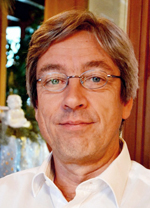Rural Round-up: new elective for undergraduates in Germany
 Jens Holst MD, from Germany is this month's Rural Round-up author. Jens specialised in internal medicine, and has a doctorate of Public Health. He is a consultant in health sciences and international cooperation and researcher on health policy, social health protection and health services research at various institutes, most recently at the Institute of General Practice and Family Medicine (until September 2015). He has longstanding experience as a university lecturer, and is currently deputising professor at the University of Applied Sciences Fulda / Germany. He writes about a new elective, undergraduate rural practice course at the University of Magdeburg.
Jens Holst MD, from Germany is this month's Rural Round-up author. Jens specialised in internal medicine, and has a doctorate of Public Health. He is a consultant in health sciences and international cooperation and researcher on health policy, social health protection and health services research at various institutes, most recently at the Institute of General Practice and Family Medicine (until September 2015). He has longstanding experience as a university lecturer, and is currently deputising professor at the University of Applied Sciences Fulda / Germany. He writes about a new elective, undergraduate rural practice course at the University of Magdeburg.
The Institute of General and Family Medicine at the University of Magdeburg in Germany has recently implemented an elective short-term rural-practice programme for creating interest in general medicine and encouraging students to work in rural practice. The two-weekend-programme started in the summer semester 2014. The objective is to teach skills of rural medical practice, make students reflect their professional and personal goals and immerse or even engage students in rural life.
The two weekends comprise a full programme developed according to participants’ expectations and applies a series of didactic tools such as presentations, interviews and discussions for bringing students closer to rural medical practice. Moderated discussions with various practitioners running different forms of rural practice in the region provided positive role models. The experience of different rural doctors´ life and work concept gave the students an idea of the social importance of their action in contrast to the technical rationality, which governs systems of instrumentality like the medical industrial complex in the context of tertiary and quaternary care of the university clinic.
Moreover, students had excellent opportunities to train specific communication skills for patient management and long-term care of patients or their families in the community. Discussions about structural issues of rural medical offices, necessary skills, workload and possible coping strategies of rural healthcare professionals accomplished the programme. Likewise students had the opportunity to get into practical skills such as manual therapy and yoga offered by a physiotherapist. The assessment performed directly after the second weekend showed that the likelihood of future rural practice had substantially increased. In the final evaluation, students appreciated particularly the diversity of topics and the seminar-like structure of the two weekend courses outside the faculty structure and rhythm.
Despite irrefutable shortage of rural practitioners, however, general practice and particularly rural health needs are still far away from being priority of the Magdeburg medical school, which is still dominated by tertiary and quaternary hospital care and largely overwhelmed by highly specialised basic research. The Institute of General Practice itself is still balancing priority setting between preparing students for overall general practice and a particular focus on the rural-practice track. And in general the interest of medical students in rural practice still offers much room for improvement. Regardless of existing obstacles, the two-weekend rural elective of the medical school in Magdeburg is promising to positively influence students’ motivation to go for rural practice.
Jens Holst
Related publication:
Citation: Holst J, Normann O, Herrmann M. Strengthening training in rural practice in Germany: new approach for undergraduate medical curriculum towards sustaining rural health care.
Rural and Remote Health 15: 3563. (Online) 2015. Available:
http://www.rrh.org.au/